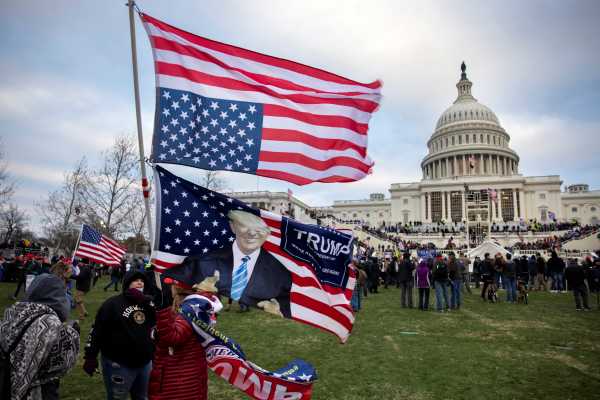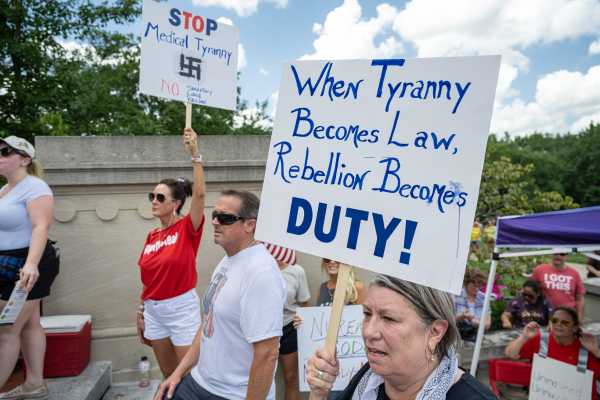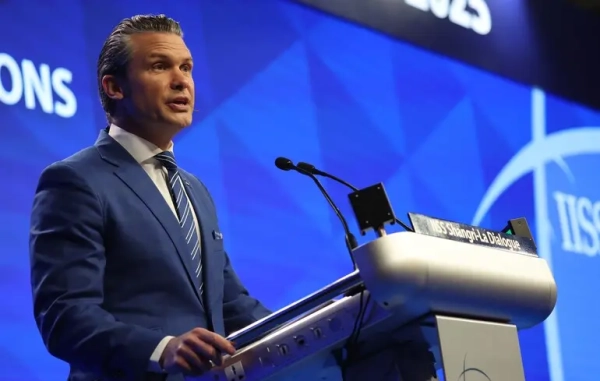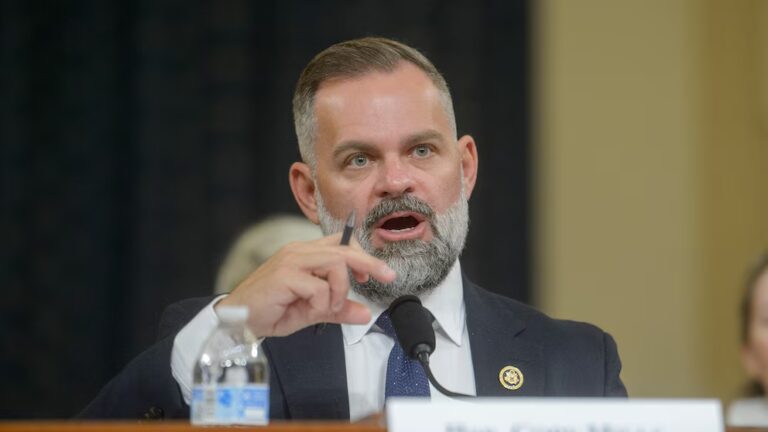
Chris Rufo is arguably the most important intellectual entrepreneur on the political right today. A senior fellow at the right-wing Manhattan Institute, he is nearly single-handedly responsible for the rise of critical race theory as a right-wing boogeyman — an issue that came to dominate the national political conversation during the Virginia gubernatorial election.
On Tuesday, Rufo elaborated a bit more on the project he has in mind: “It’s time to clean house in America: remove the attorney general, lay siege to the universities, abolish the teachers’ unions, and overturn the school boards,” he tweeted.
Confronted with unsavory parallels to militant fascist rhetoric against intellectuals, Rufo clarified that he was not calling for violence. “For the Godwin’s Law aficionados: remove the attorney general through resignation or impeachment, lay siege to the universities through cutting federal subsidies, abolish the teachers’ unions through legislation, and overturn school boards through winning elections,” he tweeted on Tuesday night.
Some of the clarifications are reassuring (there’s nothing wrong with contesting elections). But others, in particular the comments on universities and teachers unions, were disturbing. Rufo is calling for the use of law as a weapon to weaken or even eliminate the social bases of his opponents’ political power. It’s a vision of politics in which power is not shared democratically but wielded against one’s enemies.
He’s been quite explicit about this. During an appearance at the National Conservatism Conference in early November, Rufo argued that “reform around the edges is not enough” to protect America from the progressive “revolution.” Instead, conservatives should embrace a “defund the left” political strategy in which they “strangle new identity programs in red tape” and “accelerate the student loan Ponzi scheme [and] make universities partially responsible for defaults.”
Rufo’s ruthlessness is best understood as the applied version of a political vision that has become widespread in influential right-wing intellectual circles. From demagogues like Tucker Carlson to highbrow thinkers like Notre Dame’s Patrick Deneen, the emerging right-wing line is that America’s core institutions have become captured by the left and must be seized if the country is to be saved.
This means going on offense when you have power — not merely to accomplish conservative policy goals but to crush the left and stamp out its cultural viability.
The “post-liberal” right wants to go on offense
The Postliberal Order is a new Substack publication by four right-wing Christian intellectuals: Deneen, Harvard’s Adrian Vermeule, University of Dallas’s Gladden Pappin, and Catholic University’s Chad Pecknold. Its premise is that “the modern liberal ordering of the world is exhausted” — meaning not just liberalism in the American political sense but the more capacious philosophical one.
Liberal ideals of individual rights, separation of church and state, and free markets have, in their view, created a society “ever more solitary, ever more detached from ourselves, from our families, from our countries, and our God.”
In an essay published Wednesday, Deneen essentially develops an intellectual framework for Rufo-ism — the high-level justification for using the state to crush liberals and their institutions.
Deneen believes that conservatism is in a “defensive crouch” — and has been so “since its rise in the 20th century.” This may seem odd to liberals and leftists, who have seen a string of conservative victories in the past several decades: the withering of the social safety net, the demolition of labor unions, the spread of strict state-level abortion restrictions, and even the restructuring of the electoral system in the GOP’s favor. Yet in Deneen’s view, the Supreme Court’s jurisprudence on social issues over that time — abortion, same-sex marriage, and trans anti-discrimination protections — left progressivism ascendant.
“It began to dawn on many conservatives that, in spite of apparent electoral victories that have occurred regularly since the Reagan years, they have consistently lost, and lost overwhelmingly to progressive forces,” he writes.
What is the reason for this failure? Deneen cites mainstream conservative adherence to seven liberal principles — religious liberty, limited government, “the inviolability of private institutions (e.g., corporations),” academic freedom, constitutional originalism, free markets, and free speech — as the root of its defects.
“Liberalism has become consistently more aggressive in extending each of these features to their logical conclusion — their own contradiction in the form of liberal totalitarianism,” Deneen argues. Liberalism inevitably produces “the evisceration of all institutions that were originally responsible for fostering human virtue: family, ennobling friendship, community, university, polity, church.”
This so-called liberal totalitarianism — Deneen is not specific on what current policies exactly resemble Soviet or Nazi repression — cannot be defeated by the conservative establishment because it accepts basic liberal premises. In his view, mainstream conservatives “play a key role in propping up the regime,” acting as a “controlled opposition” for “the powers behind the powers — the oligarchs, the corporations, the power elite.”

Deneen, a political theorist who likes to write at a high level of abstraction, does not lay out what policies follow from his diagnosis. But he does suggest that any progress requires abandoning core liberal commitments to ideals like free speech and religious liberty — that any new conservatism should not see a respect for the diversity inherent in a large and complex society as a defining value.
“What to liberalism seems a tolerant and decent regime, in the eyes of its predecessor tradition seems nothing more than cruel indifference, allowing clear vices not only to proliferate, but to enjoy implicit public approval,” he writes, calling for a return to pre-modern Christian politics in the tradition of St. Thomas Aquinas.
So what does it mean to actually practice a politics that’s no longer “indifferent” to “clear vices”?
Rufo provides an answer. There is a reason both Rufo and Deneen single out universities for special ire: For all their flaws, they are one of the key places where liberal cultural ideals flourish.
There are differences between the two: Rufo places more emphasis on left-wing racial politics while Deneen is more exercised by debates over gender and sexuality. But what they share is a vision of conservatism on offense, wielding the power of the state against its political opponents.
The right against America
Rufo and Deneen are part of a bigger intellectual trend on the right — one in which America’s core institutions are described as hopelessly corrupted by liberal forces.
Take Tucker Carlson. His new documentary, Patriot Purge, is a conspiratorial retelling of January 6 in which peaceful demonstrators were pushed to violence by FBI agents.
This isn’t true, obviously. But think about what it would mean if it were: that the FBI, of all government agencies, was so deeply in league with Democrats and liberals that it had masterminded a totalitarian crackdown on Trump supporters. It would mean the entire edifice of the American state has become a tool for repressing conservatives.
That is the more or less explicit message of the documentary. “If permanent Washington is willing to launch a second war on terror on its citizens, what else are they capable of?” Carlson asks. “They’re telling you that crushing the civil rights of American citizens is necessary. … We must spy on our political opponents, silence them, defame them, prevent them from having jobs, take away their bank accounts, throw them in solitary confinement, shoot them in the neck.”
The Claremont Institute, a right-wing think tank in California, is dedicated to developing a more highbrow version of Carlson’s worldview — one in which American institutions and even citizens are the right’s enemy. Claremont is undoubtedly the most radically pro-Trump of any major right-wing intellectual institution, its thinkers willing to defend both his presidency and his false claims of a stolen election.
Claremont’s output in the past year or two has been astonishingly radical, all but openly calling for regime change and rebellion.
In a May Claremont podcast, Hillsdale College lecturer and former Trump administration official Michael Anton chatted with entrepreneur Curtis Yarvin — a self-described monarchist who wants to appoint a Silicon Valley CEO king of America — about their shared desire to topple what Anton terms the American “regime,” a government Yarvin characterizes in the podcast as a “theocratic oligarchy” controlled by a cadre of progressive “priests.”
During the episode, Yarvin muses about how an American strongman — whom he alternatively calls “Caesar” and, more honestly, “Trump” — could seize authoritarian control of the US government by turning the National Guard and FBI into his personal stormtroopers.
In a March article in the American Mind, Claremont’s blog, writer Glenn Elmers declares that “most people living in the United States today — certainly more than half — are not Americans in any meaningful sense of the term.” If Trump voters and conservatives do not band together and wage “a sort of counter-revolution” against these “citizen-aliens,” then “the victory of progressive tyranny will be assured.”
And an August essay in the Claremont Review of Books by scholar Angelo Codevilla describes a country whose government is clinging to “an illusion of legitimacy” after “a half-century of Progressive rule’s abuse” has demolished American society.
Views like these — that repudiate America’s core institutions and ideals, up to and often including its democracy — are becoming more and more mainstream on the right. They can be found at right-wing intellectual gatherings, like the National Conservatism conference. They can be found from one of the right’s leading moneymen, venture capitalist Peter Thiel, who once argued that “I no longer think that freedom and democracy are compatible.” They even have champions on Capitol Hill, like Sen. Josh Hawley (R-MO), a critic of “woke capitalism” who has argued that the idea that a person should be free to “define your own values” is a kind of “heresy.”
It’s easy to dismiss this kind of illiberal language as purely rhetorical: radical posturing with few practical implications. But the past year of conservative politics, from the January 6 riot to the spread of voting restrictions and extreme gerrymandering to the rise of Rufo’s war on the education system, has shown that the right’s illiberal impulses are actually shaping our reality.
Conservatism, in theory, is supposed to be an ideology of preservation. But the current right is increasingly being shaped by a reactionary impulse bent on the radical transformation — if not the outright destruction — of America’s leading institutions.
Will you support Vox’s explanatory journalism?
Millions turn to Vox to understand what’s happening in the news. Our mission has never been more vital than it is in this moment: to empower through understanding. Financial contributions from our readers are a critical part of supporting our resource-intensive work and help us keep our journalism free for all. Please consider making a contribution to Vox today to help us keep our work free for all.
Sourse: vox.com






